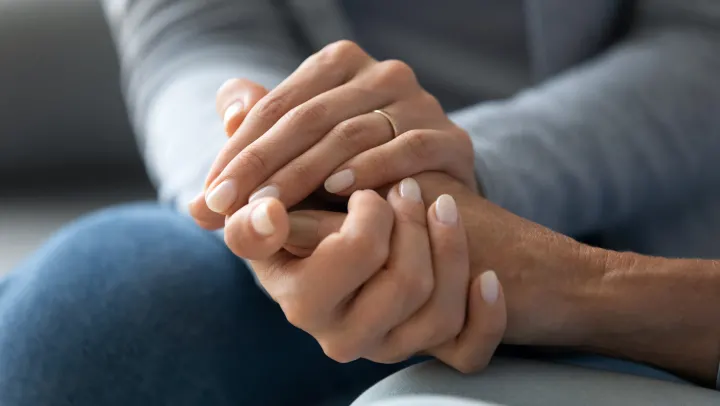Browse by categories
I help caregivers navigate conversations and decisions about senior care with clarity, confidence, and ease.
More about me
November 18, 2025
Updated 2/6/2026
It’s late, and the house is finally quiet. The only sound is the hum of the refrigerator and the occasional sigh from the next room. You should be asleep, but your mind won’t rest. Every time you close your eyes, that familiar thought returns: I should have done more.
This is what caregiver guilt feels like. It isn’t always loud or dramatic. Sometimes it’s a quiet ache that sits behind every decision, whispering that you could have done better, tried harder, been more patient. It convinces you that rest is selfish, that asking for help means you’ve failed. But here’s the truth: caregiver guilt isn’t proof that you’re not doing enough. It’s proof that you care deeply.
What Is Caregiver Guilt?
Caregiver guilt is the heavy, persistent feeling that you’ve fallen short, no matter how much you do. It often appears when you’re juggling multiple roles: caring for a loved one, managing work, keeping up with family responsibilities, and trying to hold on to a sense of self.
This kind of guilt thrives on impossible expectations. You can’t be in two places at once, but your mind tells you that you should be. You can’t control the progression of illness or aging, but you still feel responsible when things get harder.
Psychologically, caregiver guilt stems from internalized responsibility. You believe your actions directly affect your loved one’s wellbeing, even when that’s not true. When they struggle or decline, guilt interprets it as your fault.
Recognizing that pattern is the first step toward reclaiming emotional balance. Guilt may always try to whisper, but it doesn’t have to control the story.
Why Caregivers Feel Guilt
If you’ve ever asked yourself, “Why do I feel guilty as a caregiver?”, you’re not alone. The triggers are complex, but there are patterns that many caregivers share.
1. The Perfection Trap
You set high standards for yourself, doing everything “right,” every time. When those standards aren’t met, guilt rushes in. But caregiving isn’t a test you pass; it’s a relationship you navigate, often without a map.
2. Comparison
You see other caregivers who seem to do more or cope better. You scroll through photos of smiling families and think, Why can’t I hold it together like that? But what you’re comparing is your behind-the-scenes reality to someone else’s highlight reel.
3. Difficult Decisions
Few things create more guilt than deciding on outside help or senior living options. You might feel like you’re “giving up” or not keeping a promise. Yet making informed choices, sometimes hard ones, is a form of love, not neglect.
4. Emotional Exhaustion
When you’re drained, it’s easy to snap or withdraw. Later, guilt floods in. You replay the moment in your mind, forgetting that exhaustion, not indifference, caused the reaction.
When guilt mixes with resentment or frustration, know that those emotions often travel together. You can read more about how to separate them in How to Deal with Caregiver Resentment and Guilt.
5. Past Regrets
Old family dynamics often surface during caregiving. Guilt can disguise itself as unfinished forgiveness, toward yourself or your loved one.
Understanding these triggers helps you name the emotion for what it is: a signal, not a sentence.
The Emotional Cost of Caregiver Guilt
Unchecked guilt doesn’t just weigh on your heart; it reshapes how you see yourself. You start to measure your worth by your mistakes instead of your moments of care.
Over time, this emotional pressure leads to burnout. The body responds with fatigue, sleep problems, headaches, and a constant sense of tension. Emotionally, guilt feeds anxiety and depression. It tells you that self-care is selfish, creating a loop that’s hard to break.
This is where awareness becomes power. Recognizing guilt as an emotion, not a moral failing, lets you step back and choose a new response.
If you recognize the signs of emotional exhaustion creeping in, the next step is learning how to recover. Our post Caregiver Burnout: How to Reclaim Your Energy and Peace of Mind walks you through that process in detail.
If you’ve been feeling stretched thin or ashamed for needing help, remember this: no one can pour from an empty cup. Caregiver guilt and burnout often travel together, but recovery starts when you stop equating “rest” with “neglect.”
How To Deal With Caregiver Guilt
Guilt doesn’t disappear overnight, but it can soften with intention. Try these steps to begin changing your relationship with it.
1. Name What’s True
When guilt surfaces, pause and ask, What’s real here?
Often, guilt arises from imagined responsibility. Write down the situation, what you can control, and what you can’t. Seeing it on paper helps you separate feeling from fact.
2. Reframe the Inner Voice
That voice telling you you’re not doing enough isn’t truth—it’s fear disguised as duty. Replace “I should have done more” with “I did what I could with what I knew at the time.” Compassionate language retrains your mind toward balance.
3. Talk It Out
Sometimes guilt fades when it’s voiced. Sharing your thoughts with a trusted friend, counselor, or fellow caregiver can loosen guilt’s grip. If starting that conversation feels hard, The Conversation Action Plan ($9) offers simple scripts to express emotion without spiraling into self-blame. It’s a small, practical way to find relief in honesty.
4. Choose One Act of Kindness—for Yourself
When guilt tells you to do more, respond by doing something gentle instead. Take a walk, enjoy coffee without multitasking, call a friend who understands. One Small Gift, your companion shop, curates thoughtful reminders that self-care isn’t indulgence, it’s replenishment.
5. Set Boundaries Before You Burn Out
Boundaries aren’t walls; they’re clarity. Schedule protected time that’s yours alone, even if it’s brief. Use visual cues, like a closed door, headphones, or a sign that says “taking a break”, to reinforce that space. Over time, you’ll teach those around you (and yourself) that your wellbeing matters too.
Healthy Boundaries and Self-Compassion
Many caregivers struggle with the belief that love means sacrifice. But true compassion includes yourself.
Try this small exercise: imagine your best friend describing your exact situation. Would you judge them, or would you tell them they’re doing their best? Offer yourself the same grace.
If setting limits with family feels impossible, How to Have the Tough Conversations Without Arguments, Guilt, or Regret can help you find the right words. These scripts guide you through difficult conversations, how to say no with empathy, how to ask for help without guilt, and how to reset expectations that drain you.
Balancing work, caregiving, and family expectations can feel impossible at times. Prepare for the Holidays While Working and Caregiving includes strategies for staying steady when life feels especially full.
Self-compassion isn’t weakness. It’s the foundation for long-term care. Each time you choose balance, you strengthen your capacity to give.
Making Decisions Without Guilt
Decision-making often triggers guilt, especially when it involves major transitions like hiring outside help or considering senior living options. But informed choices are acts of care.
When you have clear information and perspective, guilt loses its power. The Senior Living Guides can help you evaluate options, costs, and questions to ask, so that your decisions are grounded in understanding, not emotion.
Decision guilt often spikes around big family transitions. If this is something you’ve faced before, After the Holidays: What This Year Taught You (and What to Do Next) offers insight into reflecting and resetting after emotionally charged seasons.
Clarity brings peace, and peace quiets guilt.
When Guilt Turns Into Shame
Guilt says, “I did something wrong.” Shame says, “I am something wrong.” The difference matters.
Shame drains hope, convincing you that you’re broken or unworthy. When you notice that shift, pause. Remind yourself that feelings are signals, not definitions.
If guilt has turned into shame or chronic self-blame, seek support. Talking to a counselor who understands caregiver stress can help you build healthier emotional patterns. You don’t have to carry this weight alone.
Small Steps Toward Emotional Recovery
Healing from caregiver guilt is less about dramatic change and more about daily permission. Permission to rest. To laugh. To be imperfect.
Start with one mindset shift: every act of care counts, even when it’s invisible. The load you carry is seen, even when no one says it out loud.
Consider these simple ways to reconnect with yourself:
- Begin each morning by naming one thing you’re doing right.
- Create a five-minute ritual, stretching, deep breathing, journaling, that’s yours alone.
- Keep a small reminder nearby, like a note that reads, Doing my best is enough.
These habits don’t erase guilt overnight, but they build resilience. Over time, you’ll notice the voice of guilt quieting, and a softer, wiser voice taking its place.
You’re Doing Enough
There’s a moment when every caregiver realizes that guilt doesn’t serve the person they love—it only drains the one who’s giving.
You deserve rest. You deserve support. And you deserve to see your efforts for what they truly are: love in motion.
If guilt is something you’re ready to release, start small. Choose one action from this guide today. Whether it’s opening The Conversation Action Plan, exploring the Senior Living Guides, or simply taking a deep breath and acknowledging your care, it counts.
You are enough, exactly as you are, in this moment.

Susan Myers is a Mom, Caregiver Strategist, and founder of The Aging Society. She helps family caregivers get the clarity they need to navigate aging parent care without losing themselves in the process. Her courses, resources, and Caregivers: Talk With Purpose podcast offer grounded, practical support for the moments that feel overwhelming, confusing, or heavier than expected.
Leave a Reply Cancel reply
where can I take you?
where can I take you?
Resource Center
Caregiver essentials
thoughtful giftst
conversation action plan
home
contact
blog
about
The Aging Society helps caregivers navigate conversations and decisions about senior care with clarity, confidence, and ease.

Join Others in my Weekly Newsletter